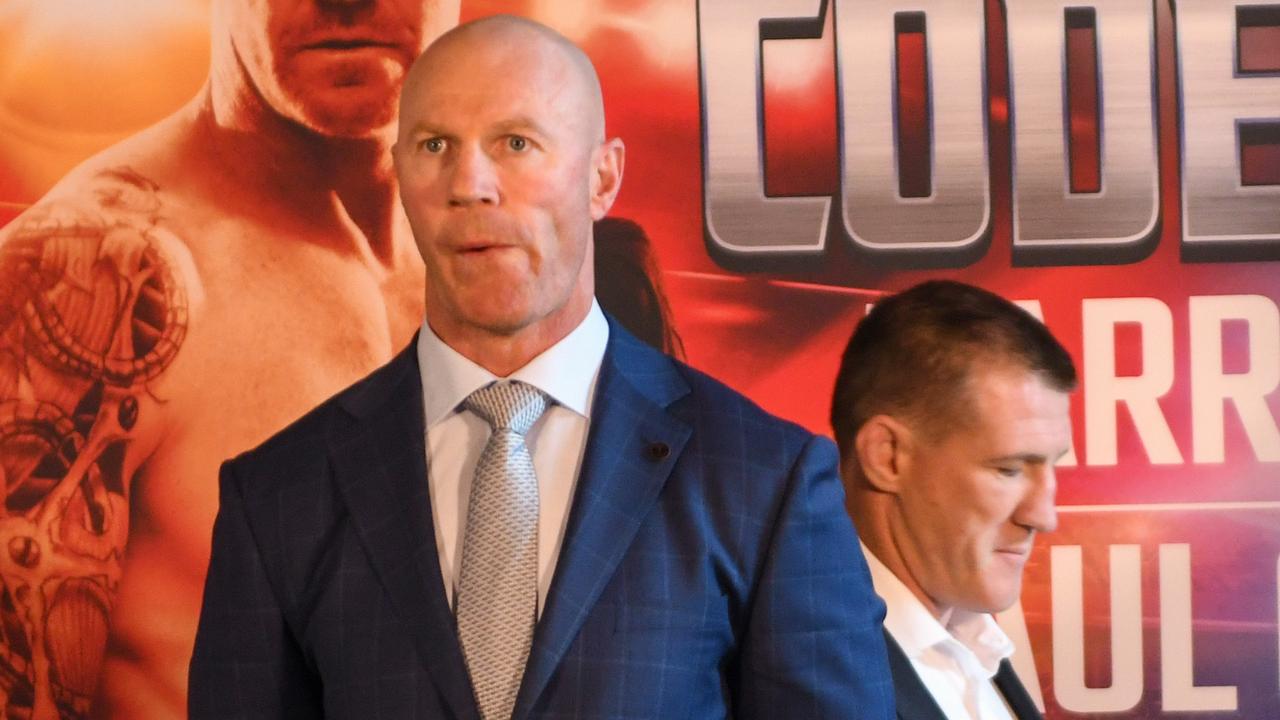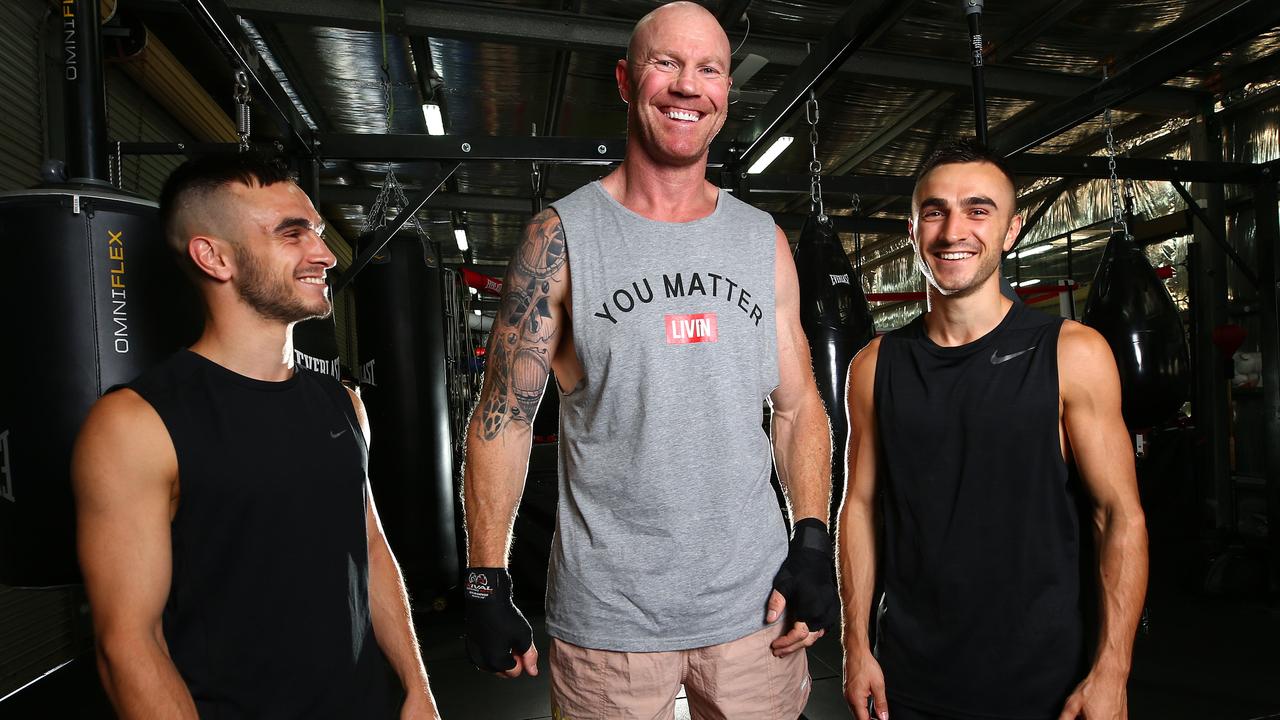Port Adelaide AFL great Kane Cornes endured heartache and grief during pursuit of footballing excellence
KANE Cornes endured much personal turmoil during his distinguished AFL career but he left the game on top, as Hamish McLachlan discovers.
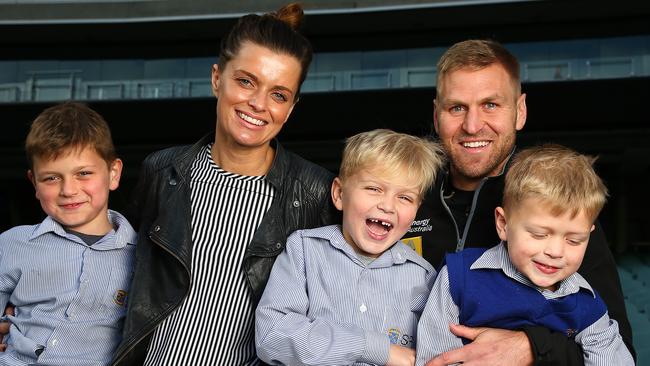
AFL
Don't miss out on the headlines from AFL. Followed categories will be added to My News.
KANE Cornes carried the weight of a famous football name with him into the AFL.
He did it so well, he became a dual All Australian, a four-time best and fairest winner and a premiership player with Port Adelaide.
What few people knew though, were the significant battles he was facing off field.
He spoke about living with stifling anxiety, its genesis, his son Eddy’s rare heart condition, the death of close teammate John McCarthy and receiving the harrowing news about his mentor, Phil Walsh.
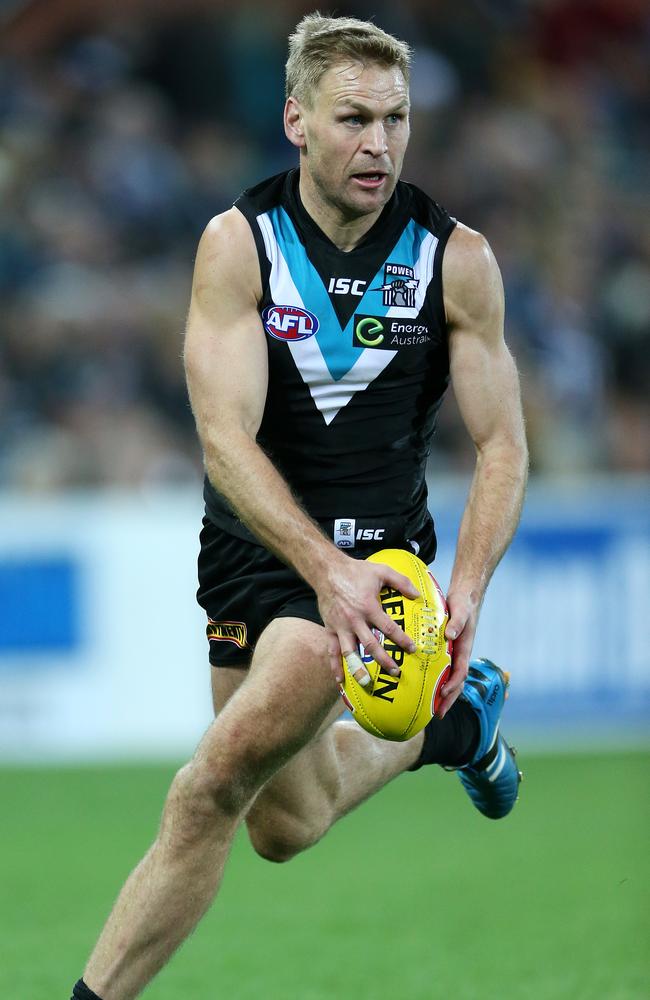
HM: How did your parents’ separation shape your life?
KC: I was only three at the time, so I’ve got no memories of mum (Pam) and dad (Graham) together at all. As a child, I remember seeing how sad mum was all the time though. She didn’t handle the separation well at all, and it probably still haunts her a bit to this day. To see your mum really sad and in emotional pain — she was rarely in a happy or good place — is tough. That is the lasting memory I’ve got from my childhood. As a result I’ve always wanted to have a stable relationship, for me, but mainly for my kids, and I was very anxious and apprehensive about it from an early age.
HM: You’ve always suffered terribly from anxiety, do you think that is a result of your parents’ broken relationship?
KC: Dad thinks it is. I remember as a child having a real fear of being left alone. He said he came home one night from being out, and the babysitter was on the couch asleep. He got out of the car and was confronted with the sight of me clawing at the glass on the window, tears running down my face and crying hysterically “Mummy. Daddy. Mummy. Daddy!” Dad thinks it was from a sense of abandonment, and that the marriage breakdown was the genesis of my insecurity and anxiety that I have always had to deal with through my life and, in particular, football. If mum or dad went out, I was always worried that they were never going to come back. I’m not sure why that was, but as a kid you don’t always think logically. That was probably an early sign of my anxiety and what was to follow.
KANE CORNES REVEALS SHOCK AT WILL MINSON SLEDGE
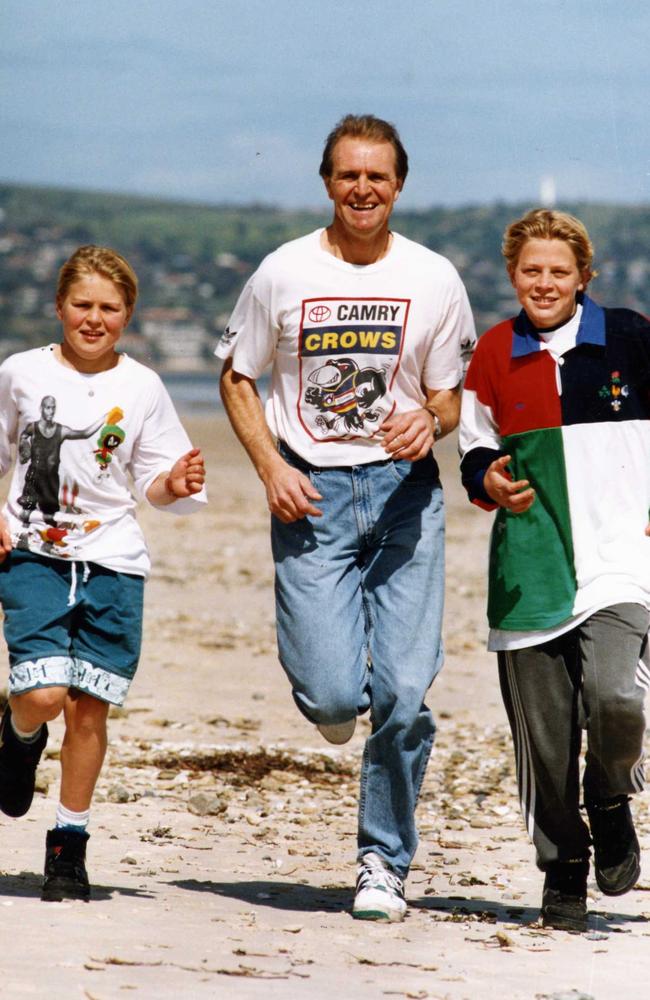
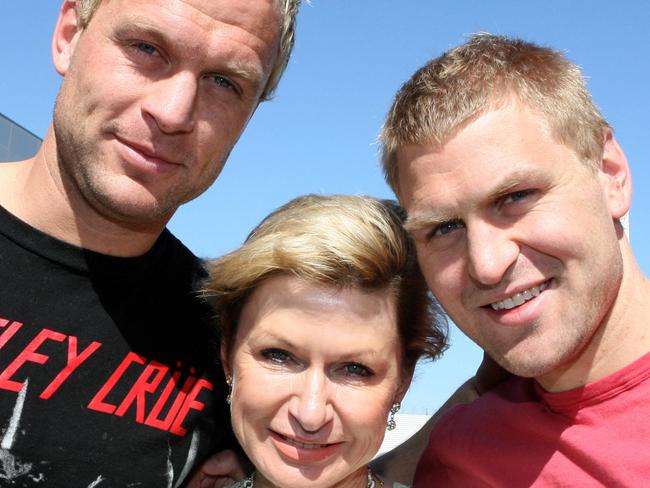
HM: Has your anxiety taken you to dark places?
KC: I went through a really difficult time in 2005. After we won the Grand Final in 2004, and the relief of winning, it was such a high, but at the start of 2005 I came crashing back down to earth. After reaching the heights of winning the Grand Final as a 21-year-old, I started the next pre-season, and was constantly wondering how I was going to beat that. I was worried I wouldn’t be able to climb the mountain again. I really struggled through that period. Mental illness is pretty tough for everyone. I’m proud of the personal development work I’ve put in and, as a result, I’ve been much happier and more confident over the past seven years. You don’t get through those times without some exceptional people around you and Choco (former Port Adelaide coach Mark Williams) and Dr Peter Barnes (club medico) were phenomenal.
HM: Your wife, Lucy, and you were childhood sweethearts. You went to school together, and then one day she asked you out for a coffee. Things have gone pretty well since.
KC: The rest is history. I didn’t drink coffee at the time, so I didn’t know why she wanted to have coffee together. I was only 15, so I had a milkshake! We walked down to the local coffee shop, Mamma Carmela’s on Jetty Road in Glenelg. That was in 1998, and other than breaking up for two hours in year 11, we’ve been together ever since.
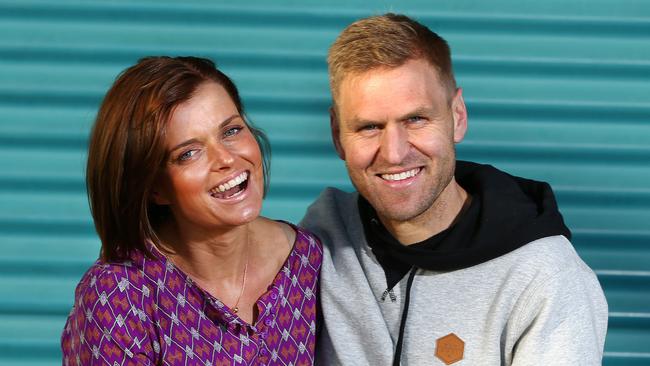
HM: You got married, Lucy fell pregnant, and you were excited at your 20-week scan, but then your life was turned upside down.
KC: Life changed quickly that afternoon. The obstetrician had been checking the pregnancy along the way, and we were told everything was going along fine. We went in for the 20-week scan and were really excited to see the first images of the baby, and we were going to find out the sex. We were going through the scan, and we found out we were having a boy, which was terrific. The obstetrician had been doing the scan for about 20 minutes, and then said she was just going to duck out to see the doctor. It felt like she was gone forever. Lucy and I should have clicked at that point, but we didn’t know any different, being the first baby, we just thought that it was a normal part of the process. After about 20 minutes or so, she came back in with a doctor, not our doctor, but someone we’d never seen before. She sat us down and said, “I really don’t know how to tell you this, in fact I’ve never seen it before, but your son’s heart is on the wrong side of his body. The heart is meant to be on the left, but his is on the right”. We were speechless. The doctor was flustered and kept talking, and drew a basic stick drawing with a love heart drawn on the right side of the body. Thanks for that, really helpful! She said she had to refer us to someone else and would get someone in tomorrow. That night was the longest I’ve ever had in my life, not knowing if your baby is going to live or die.
HM: You had no idea of your options or likely outcome?
KC: Nothing. All we knew was what we had heard — it was rare, it was on the wrong side, and we had to come back the next day to talk to someone who could shed some light on the scenario. The next day we saw a paediatric cardiologist, Dr Gavin Wheaton, at the Women’s and Children’s Hospital. He managed to ease our fears a little bit, and told us it was a common case called dextrocardia, that he’d seen it before, and that people can go on and live fine with it. He’d studied our scans, and said he couldn’t find anything structurally wrong with the heart. From what he could tell, we didn’t need to terminate the pregnancy, and that he (Eddy) should go on to live a normal life, and we should stay positive and not fret. I can’t tell you how much you appreciate a serious medical professional in a time like that.
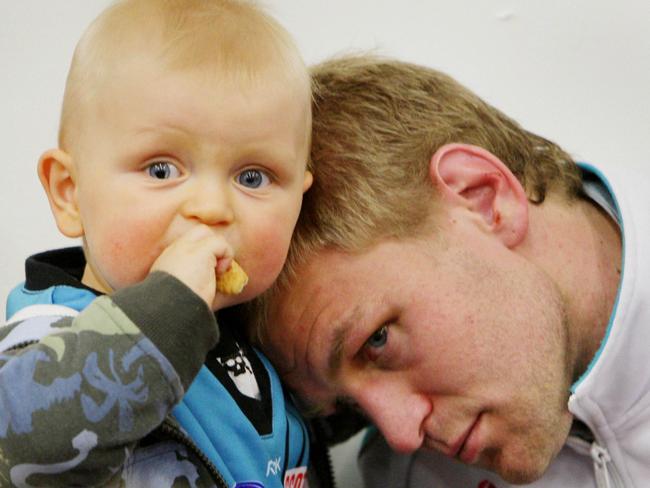
HM: The pregnancy went well?
KC: Yeah — they monitored Lucy closely but there were no issues until she got HELLP syndrome (a complication of pre-eclampsia) at 36 weeks, and we had to induce Eddy as his heart rate was erratic. Eddy was born, and he was healthy and well, but then at 10 days they were doing a routine scan and realised his heart condition was pretty serious after all, and he had partial venous pulmonary drainage where the heart pumps more blood into one lung than the other. The doctor told us he would need to perform open heart surgery on Eddy, which was terrifying.
HM: But they never had to?
KC: No, they put him on some diuretics and they sent a fibre optic cable up through his groin to see what they could do. They thought rather than risk open heart surgery at two weeks of age, they would do a catheter procedure to block off one of his arteries to see if they could slow down the flow of blood to the lung that was receiving an excessive amount, and delay the need for surgery. They thought surgery was still inevitable, but we have never needed to.
HM: This was all happening to a baby not yet three weeks old, horrible stuff. And then, five years later, when you think you are through the worst, another blow.
KC: This is actually hard to believe, but it’s true. Eddy had to have a couple of operations before he was one, more routine cardiac catheter operations. After he came out of one of them, he was really sick, he was only about four months old. I remember seeing him after the operation, and he was as white as a ghost. We went back into hospital and went to the emergency department, and they thought it was because he lost too much blood from the operation, so they gave him a blood transfusion. As soon as he had the transfusion, he sprung back to life, and he was happy again and smiling. We thought that was the end of it, but five years later, they were preparing him to have open heart surgery, which he still hasn’t had yet, but they wanted to get some more images of his heart, in readiness for when he would have the surgery. They put another catheter in to get some images of the heart with a tiny little camera. As part of that procedure, they put some dye in your body, just to see if your organs are all working properly. They noticed at that point that he didn’t have a kidney on his right side! They called us back to the hospital to meet the cardiologists. They had scanned him when he was born, so they knew that he had two healthy kidneys. They also take a video of every surgery that they do these days, and it is all stored away. So we watched the video of the second catheter operation, and you could see the catheter being pulled out through his groin, and it nicked the kidney on the way out. The kidney had then bled, shrunk up and died. That’s why he was so sick at the time.
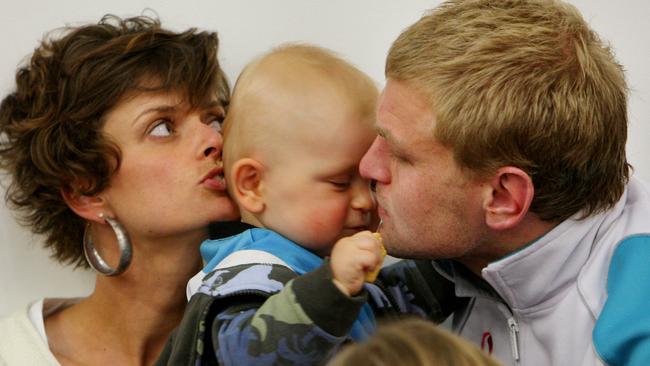
HM: So his heart is on the wrong side, and he has lost a kidney. What a tough little man.
KC: The kidney loss was probably harder to take than anything we had been through in many ways. So now Eddy has to get along in life with a bit of a strange heart and only one kidney. It makes life pretty complicated as you can imagine.
HM: And during all the heart complications in 2007, you were sleeping on the floors of the hospital, and going straight to training and games, yet you won the best and fairest and were an All Australian.
KC: I was and it was, bizarrely, clearly my best year. Maybe I didn’t worry too much about my football, and I just played, as all my energy was with Eddy. It has been a long haul, and it is ongoing, but he’s a really tough kid. He has taught me a lot of life lessons, and he has made Lucy and I stronger in our relationship. But he is terrific now — really healthy and well.
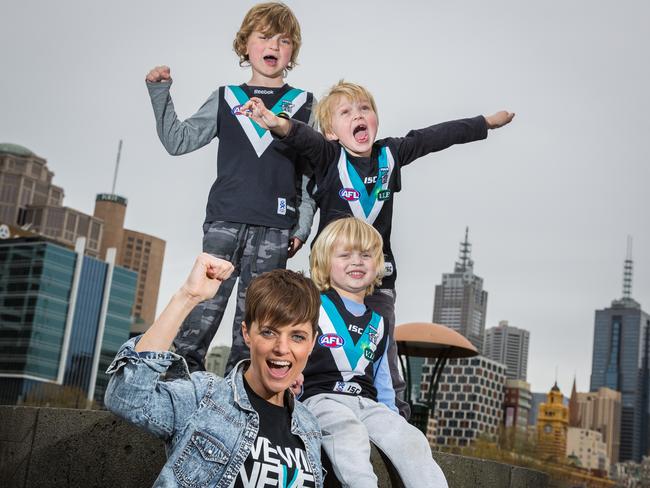

HM: You became very close to a new teammate of yours, John McCarthy. How did you find out that he had died?
KC: It was the off-season of 2012, and we’d just had the best and fairest, which I’d won, and the only reason I tell you that, is because Johnny was sitting on the opposite table and was texting me all night that I was going to win it. I will never forget that, he came up after I’d been presented the medal and gave me this massive hug and said, “I told you so!” That was the last time that I ever spoke to him. The next day, 11 or 12 of the boys took off for Vegas for the footy trip. It had been a pretty tough year for the team. Matty (Primus) had been sacked, and we’d only won about five games, the club was in financial trouble, no crowds, sponsors didn’t want to know us, Port Adelaide was just bad news. And it was emphasised because the Crows were on their way to a prelim, so we were the ugly ones in town who couldn’t do much right. You couldn’t blame the boys for wanting to get out and take off as soon as they could. And then life changed quickly. It was like someone hit pause and everything stopped. I got an email from Keith Thomas, the CEO, saying that for anyone who was still in Adelaide, to come to the club within the hour as there was something very important we needed to be told directly. I thought the club must be going under, and they were bankrupt, and they couldn’t afford to pay us. Your mind starts thinking the most odd, irrational things, and given my anxious nature anyway, the suspense was killing me, so I rang Dom Cassisi, our captain. I thought, if anyone would know what was going on, it’d be him. I asked what was going on, and his reply was “I can’t tell you, just get to the club as soon as you can.” I wouldn’t take that as an answer, so I persisted, and he said that if he told me, I could not repeat it to anyone. Dad was doing the radio show at the time, so often I had to keep information back from him, and I promised Dom I wouldn’t say a word. He told me to think of the worst possible thing that could happen. I couldn’t think of anything other than we were going out of business as a club. Then he said, “One of the boys has died on the footy trip”. I couldn’t believe it. And then he told me it was John.
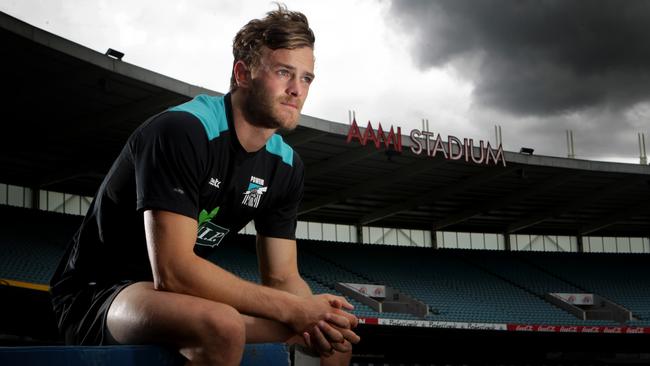
HM: You and John were very close.
KC: He was easily one of my favourite teammates, he hadn’t even been there a full year. It was remarkable how well we hit it off. He had this great balance. When he was at the club, he was training hard and doing everything he could to be the best football player he could be. But the minute he walked off the track, he was the greatest guy to be around, a practical joker, just loved telling a story, and very generous. He was from a pretty big family, and he was always telling stories about what his family was up to, he used to talk about his Collingwood days. You could listen to him for hours. We would ask him “What’s Bucks (Nathan Buckley) like, and Pendles (Scott Pendlebury), and Swanny (Dane Swan)? What’s it like to play for a big Melbourne club?’ The thing I really loved about him was that he really cared about us, his new club. I so wish he could have been a part of the fun we had in 2013 and 2014 when we got on a roll, because we had some great times and played some pretty good footy under Ken Hinkley. I wish he was there for that, but he would have been up there watching down with pride.
HM: At that stage, no coach and no president but suddenly a club on it’s knees was galvanised.
KC: He helped us as a club, for sure. His mum, Cath, was terrific and so strong. She said, “Don’t play for John. Play with John”, and that has become our mantra. There’s a big picture of Johnny in the changerooms. It’s in a part of the changerooms at the Adelaide Oval where no one can get to, apart from the players. No media or public can get into this area. Before every game, we stand in front of his picture and put our guernseys on together. On the picture it says that — “don’t play for him, play with him”. The group became a lot stronger after that, realising we had to put personal issues aside and get on with it. If Johnny left any legacy, it was that he’d brought the group together as one.
HM: Hinkley seems to have done that, too. Changed the culture. And it started from his first training session.
KC: The first training session of the year, the boys are always a bit rusty. Everyone’s nervous about the 3km run, and then you get through that, and you have this nice kick and handball session after that, which is pretty relaxed usually. I didn’t think too much of the standard of the kick and handball session as it was only November, and we were just getting back into it. Ken wasn’t too impressed, however, and he called us all over. He singled out Boaky and asked, “Do you think the kick and handball drill we just did was good enough to win the Grand Final this year?” Travis said probably not, and Ken said that from this moment, from this point on, that everything we do at this club, on the track and in the club, has to be of a standard that would win us a Grand Final, and then sent us off on another 3km time trial. I realised at that point that he was good, and wasn’t going to settle for standards that weren’t up to his level.
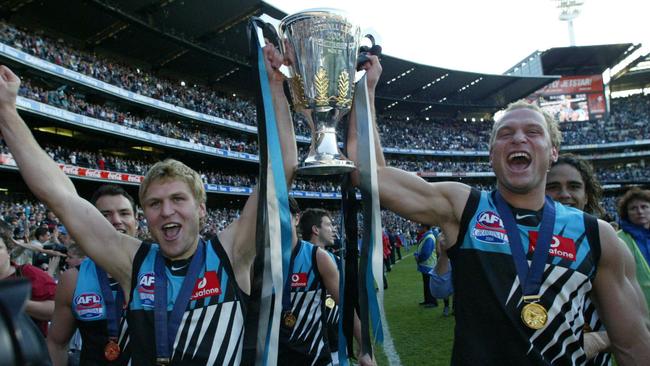
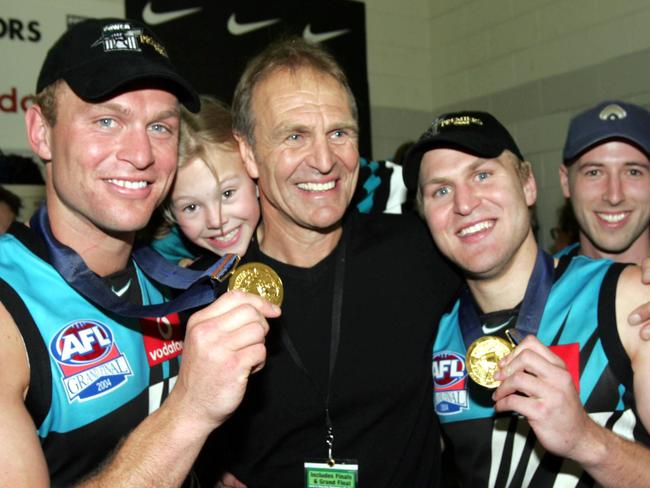
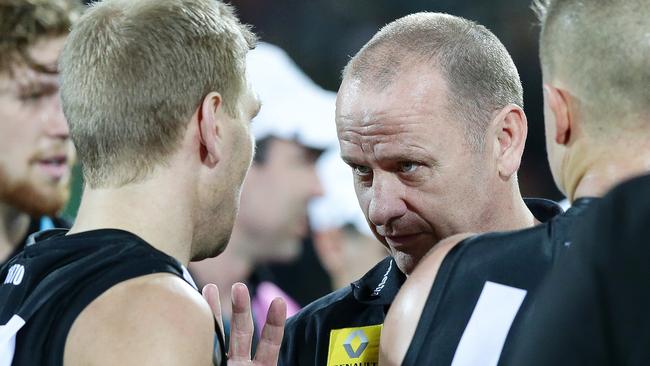
HM: And he has taken you to a kick away from a Grand Final.
KC: He is an exceptional coach.
HM: From one coach to another. You were very close to Phil Walsh. Where were you when you heard about the tragic circumstances surrounding Phil?
KC: I had just got in my car and I had the AM news on, which I never really listen to, I just have it on in the background. My ears pricked up when I heard them say a man had been murdered in Bungey Avenue, Somerton Park. I immediately thought that’s where Walshy lives, so I picked up my phone to give him a call to find out what was happening. As I was doing that, the report said the man was 55-years-old, and his son had been taken into custody. I knew Walshy’s age, and knew there had been some issues with his son, so I ran back inside and said to Lucy that I think Phil has been killed. I rang Chad, who was really close with Walshy as well, he didn’t know anything about it. I rang Dad and he hadn’t heard anything. I had this sick feeling, and I just knew it was true, and I knew it was him, but I just needed somebody to confirm it, so I rang his mobile, and Meredith answered, and before I said anything she said “Kane, it’s true. I couldn’t save him!” She was amazing, I spoke to her for about 30 seconds and she asked me if it was all right if she went, she had to call a lot of family before this got out in the media. I couldn’t believe that she answered my call. It is still impossible for me to get my head around. He was a remarkable man and he will be sorely missed by many people.
HM: You and he had a very special relationship, he gave you a lot of confidence. I’ve heard you had a weekly Monday ritual.
KC: Yep, we did. As soon as the team meeting finished on the Monday, I used to go straight down to his office and we would pull out his laptop and look at the video edits. Usually I would have the tagging job on someone good, so we would never watch me or my game personally, but we would watch the guy I was on, and what they did. That would determine in his eyes how I played. That would last 15 or 20 minutes, and I would get a gauge of what he thought of my game. He was always brutally honest, but then it would morph out to what was going on around the place, how were Lucy and the kids. We’d argue over which player I should go to the next week. To be able to spend that 30-60 minutes with him every single week was unbelievable. There were 40 odd players on the list, but he always seemed to have time for me. It certainly helped me as a player and as a person.
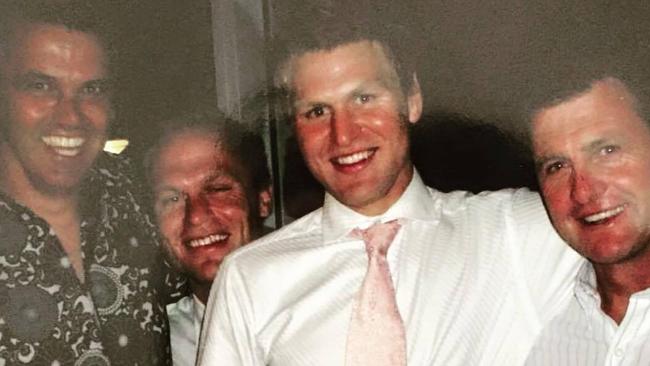
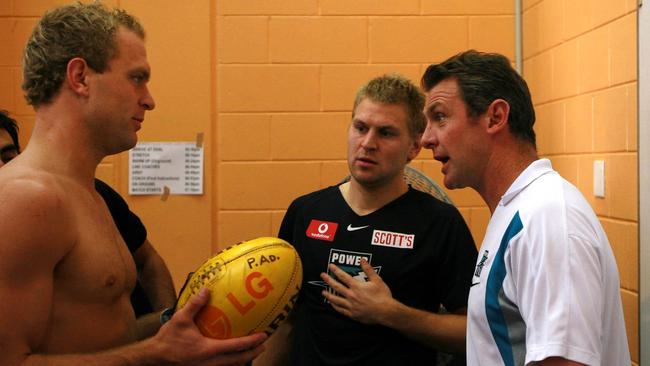
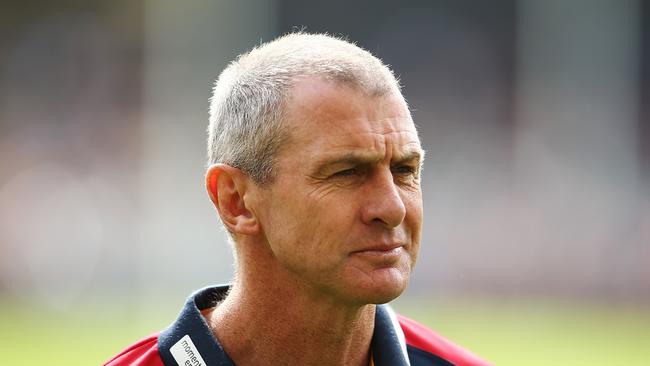
HM: After all the years, and 300 games, you decide to take the fire exit.
KC: People struggle to get their head around it a bit, leaving footy to become a fireman.
HM: People grow up wanting to be a footballer or a fireman — you’ve become both!
KC: When you look at it like that, it should be easy to understand!
HM: There was an inaccurate view that you are selfish in leaving the club midyear.
KC: It was a mutual agreement pretty much. The club was very supportive. Ken and I had conversations over the pre-season, and we both knew this was going to be my final year. He was going to manage me through it and rest me here and there. He rested me in Round 3 against North Melbourne, which was a big game for us. We were 0 and 2. I didn’t think I needed a rest. I probably wasn’t giving the full 100 per cent and mental performance that he needed from me, like I had done for the last 14 years. From that moment on I thought if the chance came up I’d jump at it. I knew he would be relieved he didn’t have to end my career playing in the SANFL.
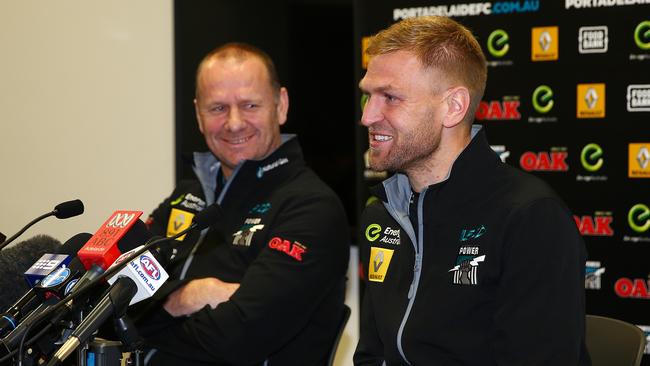
HM: Ken made it easy in the end, didn’t he?
KC: He really did. I was so nervous telling him, I didn’t know what he’d think, whether I was letting him down. There was also the fact that we were top four favourites at that stage. I thought it would be tough to watch if the boys could get it together and make the Grand Final. But even that didn’t sway me because I knew that I couldn’t give them the performance that they needed. I didn’t even know if I was in the best 22. It really was an easy call in the end. I miss that a little bit but am still really happy with the decision. Clubs can be pretty quick to tell players when they are not wanted, so I don’t think it’s unreasonable for a player to leave when they don’t feel they are up to it any more.
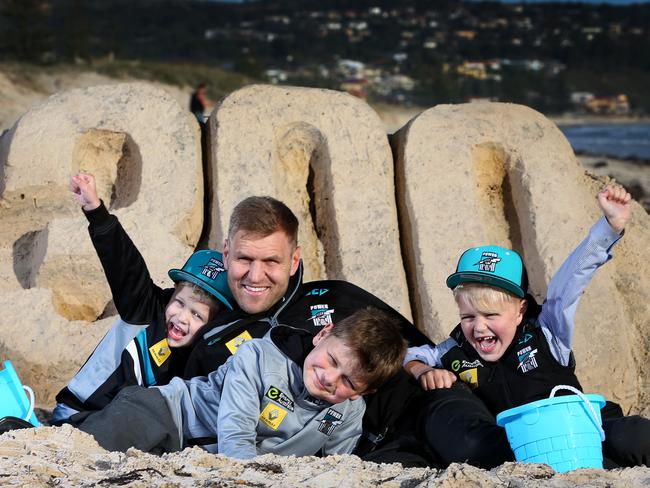
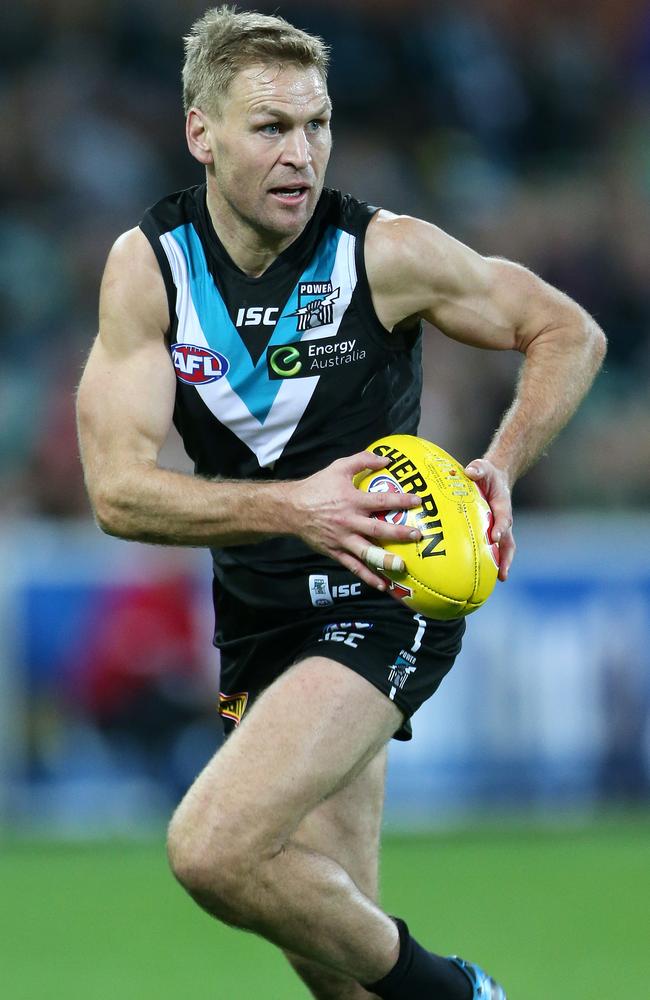
HM: It’s been an extraordinary career, you’ve achieved exceptional things, and to be able to do what you have done while battling with Eddy and all the other noise around you is remarkable. Well done.
KC: Thanks Hame, I appreciate it.

